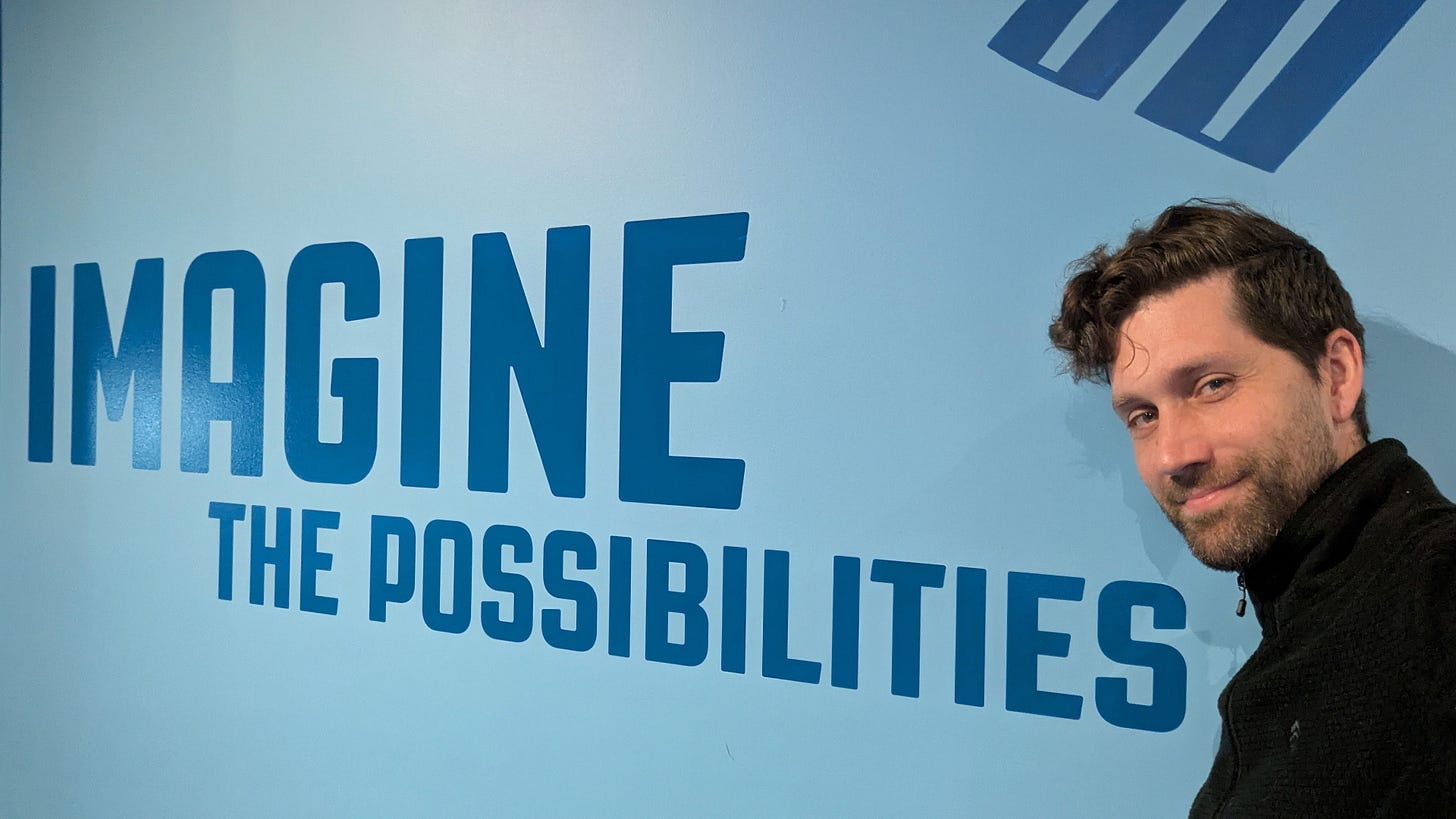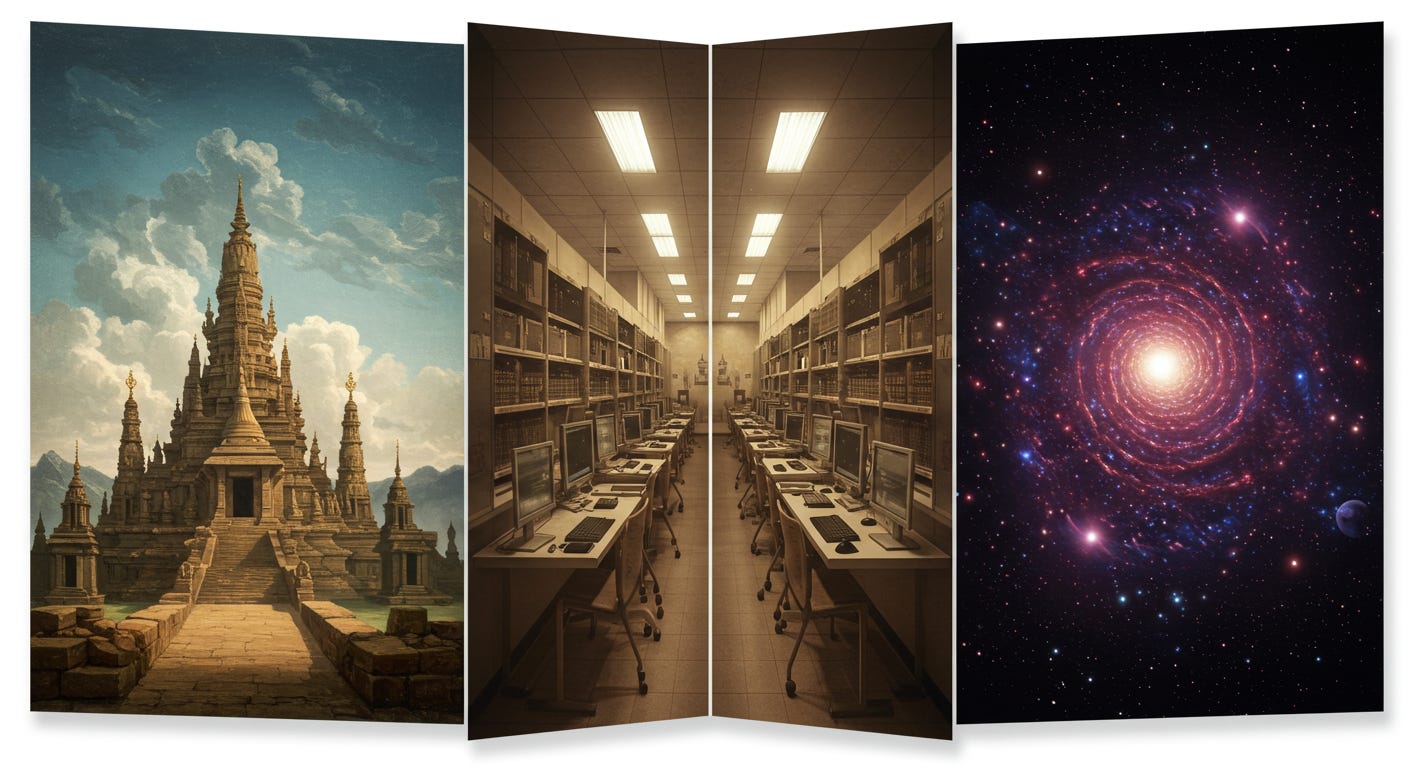Happy New Year! First, some news:
2025 stars with me in final edits for my first book How To Live In The Future (coming out soon from Revelore Press), an essay on evolution and technology for Aeon Magazine, and an essay on data as a sacred text for Hurry Up We’re Dreaming.
The first two episodes of Humans On The Loop are out, with Richard Doyle and Benjamin Olsen. Tyson Yunkaporta is next, and another 25 weekly episodes are in the queue and I’m recording more this month. As far as “core curriculum for a wizard school in the age of magical technologies” goes, I’m pleased with the scope and variety of perspectives so far. You can see the roadmap for here.
I’m going to start hosting monthly calls for patrons and to publish additional essays and reviews, and maybe even science fiction. The more I read, watch, and listen to for this project, the more inspired I am to write more than I promised for my grants — and I’m sure pop culture will provide plenty of fresh takes at the intersection of technology and wisdom.
The first community hangout of the new year will be on Saturday, 18 January at 2 pm Mountain Time (1 pm Pacific/4 pm Eastern). I’ll provide patrons with call details soon! Excited to be back in the saddle with everyone. Our COVID lockdown hangouts kind of saved my sanity and it’s important to have a space like this.
Lastly, I am working on an online course (!) for May & June. More on that shortly.
Thanks for reading. If you would like to partner with this project, please reach out.
Michael
Reflections on Eternity & Technology
In July of 2013, sweating bullets in the swamp-turned-megalopolis they call Manhattan, I stood with my brand-new Google Glass in one hand and my dog-eared copy of Doug Rushkoff’s Present Shock: When Everything Happens Now in the other. In my pocket was the brand new smartphone I’d avoided for so long that I was last among my friends to get one, forced in the end to take the hit in order to connect it to the future as the tether to my wearable search/camera interface. There amidst the synchronistic flow of New York, I first walked along a turn-by-turn path mapped for me from door to door…but the overlay I couldn’t put back in its bag was Rushkoff’s commentary on the city as a giant circuit board reshaped by algorithmic trading. I felt some deep source from which the grit and urgency of urban life could not be isolated from transcendent, numinous experience: the way the cost of real estate sloped down with distance from the stock exchange, the everything-at-once-ness of the place, the surging serendipities that burst forth everywhere around me on my pilgrimage, and my fresh integration with an everlasting photographic database and speech-to-text abilities all seemed to be one thing.
The strangest part of it was how I felt as if I’d slipped into a current of myth, magic, and trans-temporality – a synchronistic vortex that collapsed this century into the distant past and future. The initiation I received in Google’s Chelsea office wasn’t just into their public beta for a new consumer product, but into vertiginous awareness of some always-and-already co-occasion of the sacred and mundane. The room in which they handed me my glasses, humming with the quiet orchestration of computers and employees, wasn’t just a corporate spectacle to make new users feel like they were part of something special; it was (unintentionally) a window through which I could peer across time’s axis and see how this temple stood alongside countless others, caves to hyperspace, as if scanning down the rhyme-words of a poem that began and ended over the horizons of humanity. Memory and information processing, gross matter and ineffable futurity, drew up my story into a mysterious hinted order. Everybody felt it but nobody understood.
Since then I’ve known that everything we notice, everything we want and frame and diarize, is figured in this pattern. Whatever we find meaningful is a knot in this immense eternal fabric. Art and industry are not-two, nor are they exclusive to our species. I was pulled into the city in the same way mitochondria were pulled into the nucleated cell, and one day structures so enormous they defy description will, in turn, be folded into even-greater structures: something incommunicable spoke and organized itself in order to be heard. (Trying to squeeze eternity into this serial expression feels absurd, which is a symptom of its pressure of becoming. Present Shock, indeed.)
Did this experience induce a sense of obligation to help midwife godlike super-minds? Sort of, in the sense that glimpsing the eternal as it focuses in you and your own life gives you an address on a landscape without boundary, a sense of place and meaning. But I didn’t make the classic tragic error of believing I could understand what I had seen, or that I knew why little “I” was drawn up into this unfolding. Two days later, trying to unpack it for a friend of mine, I told her that I felt like we were on the cusp of something vast and awesome and, yes, terrifying — like a childbirth — and that it could go very wrong, and that if I had any role to play in all of this, that it would be to play some minor part in helping to ensure a healthy happy baby. I could not pretend to know how it would all play out, just that my life made sense, and that this sense was bigger than my efforts to explain it. I found responsibility and purpose in the path of being a good ancestor, which demands a letting-go of expectations. You have to love surprise, or when it comes your image of what you believed should happen interferes with your ability to serve the process.
And then there’s what should be obvious: if it’s speaking to us now, we are already in this superstructure. We don’t have to push the river. We may be on a raft but it is not our job to make it reach the sea. Eternity is not in time; time’s in eternity.
As William Irwin Thompson put it to me in 2011:
“Prophecy is a function of the imagination in exploring the implications of the present and rendering those implications into the metaphor of the future…because [prophets] are sensitive to an imaginative mode of hyper-dimensional perception, when they collapse down into three-dimensional space-time they tend to suffer from what Whitehead called misplaced concreteness, and they get it wrong.”
I try not to make the same mistake, believing “up” is “forward” just because I live in Flatland.
Then there’s the other side of technological religiosity. We have an extensive list of bad trips…



